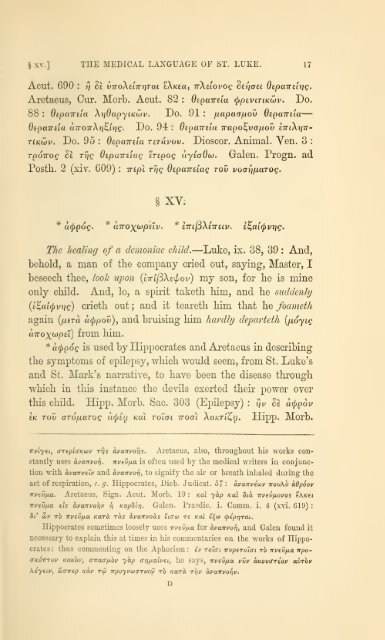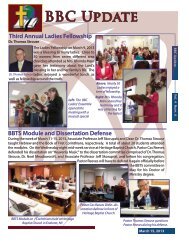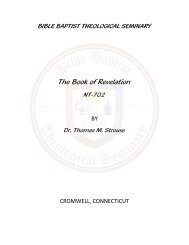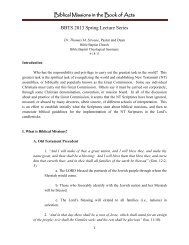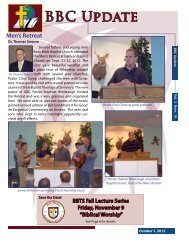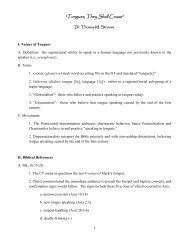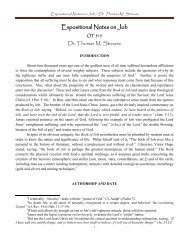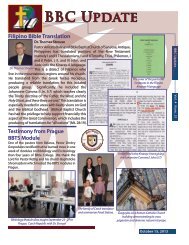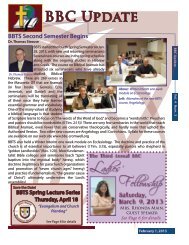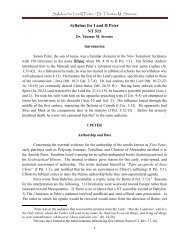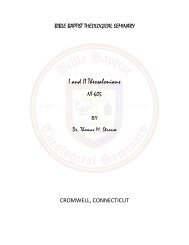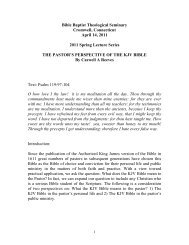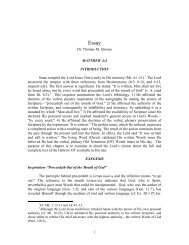- Page 1 and 2:
ii>Mi^yf^i'/)r>rfr^}^)rfi^^M'>^^
- Page 3: THE MEDICAL LANGUAGE OF ST. LUKE.
- Page 6 and 7: DUBLIN : PRINTED AT THE UNIVERSITY
- Page 9 and 10: PREFACE. rriHE words and phrases ci
- Page 11: PREFACE. ix The author here desires
- Page 14 and 15: xii CONTENTS. SECTION PAGE VII. Luk
- Page 16 and 17: . xiv CONTENTS. SECTION PAGE XXIII.
- Page 18 and 19: i CONTENTS. SECTION PAGE XL. Luke,
- Page 20 and 21: . CONTENTS. SECTION LVII. Luke, i.
- Page 22 and 23: — XX SECTION LXVI. Luke, x. conti
- Page 24 and 25: — xxii CONTENTS. SECTION LXXIV. L
- Page 26 and 27: . xxiv CONTENTS. SECTION PAGE LXXXI
- Page 28 and 29: — xxvi CONTENTS. SECTION LXXXIX.
- Page 30 and 31: — xxviii CONTENTS. SECTION XCVII.
- Page 32 and 33: — XXX INTRODUCTION. remarks on th
- Page 34 and 35: — — xxxii INTRODUCTION. using w
- Page 36 and 37: — — xxxlv INTRODUCTION. * avacT
- Page 38 and 39: xxxvi INTRODUCTION. ring uniformly
- Page 40 and 41: 2 THE MEDICAL LANGUAGE OF ST. LUKE.
- Page 42 and 43: 4 THE MEDICAL LANGUAGE OF ST. LUKE.
- Page 44 and 45: . : 6 THE MEDICAL LANGUAGE OF ST. L
- Page 46 and 47: 8 THE MEDICAL LANGUAGE OF ST. LUKE.
- Page 48 and 49: . 10 THE MEDICAL LANGUAGE OF ST. LU
- Page 50 and 51: — 12 THE MEDICAL LANGUAGE OP ST.
- Page 52 and 53: — : 14 THE MEDICAL LANGUAGE OF ST
- Page 56 and 57: 18 THE MEDICAL LANGUAGE OF ST. LUKE
- Page 58 and 59: — — —: 20 THE MEDICAL LANGUAG
- Page 60 and 61: : 22 THE MEDICAL LANGUAGE OF ST. LU
- Page 62 and 63: — : 24 THE MEDICAL LANGUAGE OF ST
- Page 64 and 65: ; 26 THE MEDICAL LANGUAGE OF ST. LU
- Page 66 and 67: 28 THE MEDICAL LANGUAGE OF ST. LUKE
- Page 68 and 69: 30 THE MEDICAL LANGUAGE OF ST. LUKE
- Page 70 and 71: : 32 THE MEDICAL LANGUAGE OF ST. LU
- Page 72 and 73: : 34 THE MEDICAL LANGUAGE OF ST. LU
- Page 74 and 75: : 36 THE MEDICAL LANGUAGE OF ST. LU
- Page 76 and 77: 38 THE MEDICAL LANGUAGE OF ST. LUKE
- Page 78 and 79: 40 THE MEDICAL LANGUAGE OF ST. LUKE
- Page 80 and 81: 42 THE MEDICAL LANGUAGE OF ST. LUKE
- Page 82 and 83: 44 THE MEDICAL LANGUAGE OF ST. LUKE
- Page 84 and 85: : 46 THE MEDICAL LANGUAGE OF ST. LU
- Page 86 and 87: 48 THE MEDICAL LANGUAGE OF ST. LUKE
- Page 88 and 89: 50 THE MEDICAL LANGUAGE OF ST. LUKE
- Page 90 and 91: : 52 THE MEDICAL LANGUAGE OF ST. LU
- Page 92 and 93: 54 THE MEDICAL LANGUAGE OF ST. LUKE
- Page 94 and 95: 56 THE MEDICAL LANGUAGE OF ST. LUKE
- Page 96 and 97: — 58 THE MEDICAL LANGUAGE OF ST.
- Page 98 and 99: — — — 60 THE MEDICAL LANGUAGE
- Page 100 and 101: — — 62 THE MEDICAL LANGUAGE OF
- Page 102 and 103: : 64 THE MEDICAL LANGUAGE OF ST. LU
- Page 104 and 105:
— — : 66 THE MEDICAL LANGUAGE O
- Page 106 and 107:
— — — — 68 THE MEDICAL LANG
- Page 108 and 109:
— :. 70 THE MEDICAL LANGUAGE OF S
- Page 110 and 111:
— — 72 THE MEDICAL LANGUAGE OF
- Page 112 and 113:
— — Matt. V. 13 : "Ye trodden u
- Page 114 and 115:
— : 76 THE MEDICAL LANGUAGE OF ST
- Page 116 and 117:
— — 78 THE MEDICAL LANGUAGE OF
- Page 118 and 119:
80 THE MEDICAL LANGUAGE OF ST. LUKE
- Page 120 and 121:
: 82 THE MEDICAL LANGUAGE OF ST. LU
- Page 122 and 123:
: 84 THE MEDICAL LANGUAGE OF ST. LU
- Page 124 and 125:
. 86 THE MEDICAL LANGUAGE OF ST. LU
- Page 126 and 127:
88 THE MEDICAL LANGUAGE OF ST. LUKE
- Page 128 and 129:
: 90 THE MEDICAL LANGUAGE OF ST. LU
- Page 130 and 131:
— 92 THE MEDICAL LANGUAGE OF ST.
- Page 132 and 133:
:; 94 THE MEDICAL LANGUAGE OF ST. L
- Page 134 and 135:
— : 96 THE MEDICAL LANGUAGE OF ST
- Page 136 and 137:
: 98 THE MEDICAL LANGUAGE OF ST. LU
- Page 138 and 139:
; 100 THE MEDICAL LANGUAGE OF ST. L
- Page 140 and 141:
102 THE MEDICAL LANGUAGE OF ST. LUK
- Page 142 and 143:
: : I 104 THE MEDICAL LANGUAGE OF S
- Page 144 and 145:
106 THE MEDICAL LANGUAGE OF ST. LUK
- Page 146 and 147:
: 108 THE MEDICAL LANGUAGE OF ST. L
- Page 148 and 149:
: 110 THE MEDICAL LANGUAGE OF ST. L
- Page 150 and 151:
112 THE MEDICAL LANGUAGE OF ST. LUK
- Page 152 and 153:
: lU THE MEDICAL LANGUAGE OF ST. LU
- Page 154 and 155:
IIG THE MEDICAL LANGUAGE OF ST. LUK
- Page 156 and 157:
. : 118 THE MEDICAL LANGUAGE OF ST.
- Page 158 and 159:
120 THE MEDICAL LANGUAGE OF ST. LUK
- Page 160 and 161:
: 122 THE MEDICAL LANGUAGE OF ST. L
- Page 162 and 163:
' : 124 THE MEDICAL LANGUAGE OF ST.
- Page 164 and 165:
126 THE MEDICAL LANGUAGE OF ST. LUK
- Page 166 and 167:
. ; 128 THE MEDICAL LANGUAGE OF ST.
- Page 168 and 169:
130 THE MEDICAL LANGUAGE OF ST. LUK
- Page 170 and 171:
: 132 THE MEDICAL LANGUAGE OF ST. L
- Page 172 and 173:
: 134 THE MEDICAL LANGUAGE OF ST. L
- Page 174 and 175:
136 THE MEDICAL LANGUAGE OF ST. LUK
- Page 176 and 177:
— 138 THE MEDICAL LANGUAGE OF ST.
- Page 178 and 179:
. : 140 THE MEDICAL LANGUAGE OF ST.
- Page 180 and 181:
142 THE MEDICAL LANGUAGE OF ST. LUK
- Page 182 and 183:
144 THE MEDICAL LANGUAGE OF ST. LUK
- Page 184 and 185:
146 THE MEDICAL LANGUAGE OF ST. LUK
- Page 186 and 187:
: 148 THE MEDICAL LANGUAGE OF ST. L
- Page 188 and 189:
150 THE MEDICxVL LANGUAGE OF ST. LU
- Page 190 and 191:
. 152 THE MEDICAL LANGUAGE OF ST. L
- Page 192 and 193:
: 154 THE MEDICAL LANGUAGE OF ST. L
- Page 194 and 195:
156 THE MEDICAL LANGUAGE OF ST. LUK
- Page 196 and 197:
—: 158 THE MEDICAL LANGUAGE OF ST
- Page 198 and 199:
. 160 THE MEDICAL LANGUAGE OF ST. L
- Page 200 and 201:
—: 162 THE MEDICAL LANGUAGE OF ST
- Page 202 and 203:
: 1C4 THE MEDICAL LANGUAGE OF ST. L
- Page 204 and 205:
166 THE MEDICAL LANGUAGE OF ST. LUK
- Page 206 and 207:
168 THE MEDICAL LANGUAGE OF ST. LUK
- Page 208 and 209:
; 170 THE MEDICAL LANGUAGE OF ST. L
- Page 210 and 211:
172 THE MEDICAL LANGUAGE OF ST. LUK
- Page 212 and 213:
: 174 THE MEDICAL LANGUAGE OF ST. L
- Page 214 and 215:
: 176 THE MEDICAL LANGUAGE OF ST. L
- Page 216 and 217:
178 THE MEDICAL LANGUAGE OF ST. LUK
- Page 218 and 219:
:: 180 THE MEDICAL LANGUAGE OF ST.
- Page 220 and 221:
— 182 THE MEDICAL LANGUAGE OF ST.
- Page 222 and 223:
a 184 THE MEDICAL LANGUAGE OF ST. L
- Page 224 and 225:
: 186 THE MEDICAL LANGUAGE OF ST. L
- Page 226 and 227:
188 THE MEDICAL LANGUAGE OF ST. LUK
- Page 228 and 229:
190 THE MEDICAL LANGUAGE OF ST. LUK
- Page 230 and 231:
192 THE MEDICAL LANGUAGE OF ST. LUK
- Page 232 and 233:
— : lU THE MEDICAL LANGUAGE OF ST
- Page 234 and 235:
196 THE MEDICAL LANGUAGE OF ST. LUK
- Page 236 and 237:
198 THE MEDICAL LANGUAGE OF ST. LUK
- Page 238 and 239:
: 200 THE MEDICAL LANGUAGE OF ST. L
- Page 240 and 241:
: 202 THE MEDICAL LANGUAGE OF ST. L
- Page 242 and 243:
204 THE MEDICAL LANGUAGE OF ST. LUK
- Page 244 and 245:
206 THE MEDICAL LANGUAGE OF ST. LUK
- Page 246 and 247:
208 THE MEDICAL LANGUAGE OF ST. LUK
- Page 248 and 249:
; 210 THE MEDICAL LANGUAGE OF ST. L
- Page 250 and 251:
: 212 THE MEDICAL LANGUAGE OF ST. L
- Page 252 and 253:
214 THE MEDICAL LANGUAGE OF ST. LUK
- Page 254 and 255:
. 216 THE MEDICAL LANGUAGE OF ST. L
- Page 256 and 257:
218 THE MEDICAL LANGUAGE OF ST. LUK
- Page 258 and 259:
220 THE MEDICAL LANGUAGE OF ST. LUK
- Page 260 and 261:
: I 222 THE MEDICAL LANGUAGE OF ST.
- Page 262 and 263:
: I 224 THE MEDICAL LANGUAGE OF ST.
- Page 264 and 265:
: 226 THE MEDICAL LANGUAGE OF ST. L
- Page 266 and 267:
. : 228 THE MEDICAL LANGUAGE OF ST.
- Page 268 and 269:
230 THE MEDICAL LANGUAGE OF ST. LUK
- Page 270 and 271:
232 THE MEDICAL LANGUAGE OF ST. LUK
- Page 272 and 273:
. 1 234 THE MEDICAL LANGUAGE OF ST.
- Page 274 and 275:
: I 236 THE MEDICAL LANGUAGE OF ST.
- Page 276 and 277:
i 238 THE MEDICAL LANGUAGE OF ST. L
- Page 278 and 279:
. : 240 THE MEDICAL LANGUAGE OF ST.
- Page 280 and 281:
242 THE MEDICAL LANGUAGE .OF ST. LU
- Page 282 and 283:
: 244 THE MEDICAL LANGUAGE OF ST. L
- Page 284 and 285:
246 THE MEDICAL LANGUAGE OF ST. LUK
- Page 286 and 287:
248 THE MEDICAL LANGUAGE OF ST. LUK
- Page 288 and 289:
250 THE MEDICAL LANGUAGE OF ST. LUK
- Page 290 and 291:
— 252 THE MEDICAL LANGUAGE OF ST.
- Page 292 and 293:
— • 254 THE MEDICAL LANGUAGE OF
- Page 294 and 295:
256 THE MEDICAL LANGUAGE OF ST. LUK
- Page 296 and 297:
; 2')8 THE MEDICAL LANGUAGE OF ST.
- Page 298 and 299:
260 THE MEDICAL LANGUAGE OF ST. LUK
- Page 300 and 301:
262 THE MEDICAL LANGUAGE OF ST. LUK
- Page 302 and 303:
264 THE MEDICAL LANGUAGE OF ST. LUK
- Page 304 and 305:
26C THE MEDICAL LANGUAGE OF ST. LUK
- Page 306 and 307:
: 268 THE MEDICAL LANGUAGE OF ST. L
- Page 308 and 309:
270 THE MEDICAL LANGUAGE OF ST. LUK
- Page 310 and 311:
272 THE MEDICAL LANGUAGE OF ST. LUK
- Page 312 and 313:
: 274 THE MEDICAL LANGUAGE OF ST. L
- Page 314 and 315:
276 THE MEDICAL LANGUAGE OF ST. LUK
- Page 316 and 317:
: 278 THE MEDICAL LANGUAGE OF ST. L
- Page 318 and 319:
: i 280 THE MEDICAL LANGUAGE OF ST.
- Page 320 and 321:
282 THE MEDICAL LANGUAGE OF ST. LUK
- Page 322 and 323:
;: 284 THE MEDICAL LANGUAGE OF ST.
- Page 324 and 325:
286 THE MEDICAL LANGUAGE OF ST. LUK
- Page 326 and 327:
— : 288 THE MEDICAL LANGUAGE OF S
- Page 328 and 329:
: 290 THE MEDICAL LANGUAGE OF ST. L
- Page 330 and 331:
NOTE. PROBABILITY OF ST. PAUL'S EMP
- Page 332 and 333:
294 THE MEDICAL LANGUAGE OF ST. LUK
- Page 334 and 335:
296 THE MEDICAL LANGUAGE OF ST. LUK
- Page 337 and 338:
INDEX. An Asterisk has been prefixe
- Page 339 and 340:
:; INDEX. 301 *SiaTripe7v, Luke, ii
- Page 341 and 342:
: INDEX. 303 '\eirls, Acts, ix. 18,
- Page 343:
iv. 34. 34. 37 ; v. 4 ; vii. 55 ; ;
- Page 346 and 347:
— : The Correspondence of Robert
- Page 348 and 349:
— WORKS published by LONGMANS 6-
- Page 350 and 351:
WORKS piilished by LONGMANS 6- CO.
- Page 352 and 353:
— V/OI^KS piihlished by LONGMANS
- Page 354 and 355:
Proctor's ; ; WORKS published by LO
- Page 356 and 357:
;; lO WORKS published by LONGMANS 6
- Page 358 and 359:
; 12 WORKS puUished by LONGMANS &>
- Page 360 and 361:
14 WORKS published by LONGMANS (2^
- Page 362 and 363:
; The i6 WORKS published by LONGMAN
- Page 364 and 365:
— ; — i8 WORKS published by LON
- Page 366 and 367:
WORKS published by LONGMANS 6- CO.
- Page 368 and 369:
. & . Papacy . 81 22 WORKS publishe
- Page 370:
24 WORKS puhlishcd by LONGMANS 6- C
- Page 373:
' i . " >.v.-'^^ .-^^^-j- 3 1158 00


